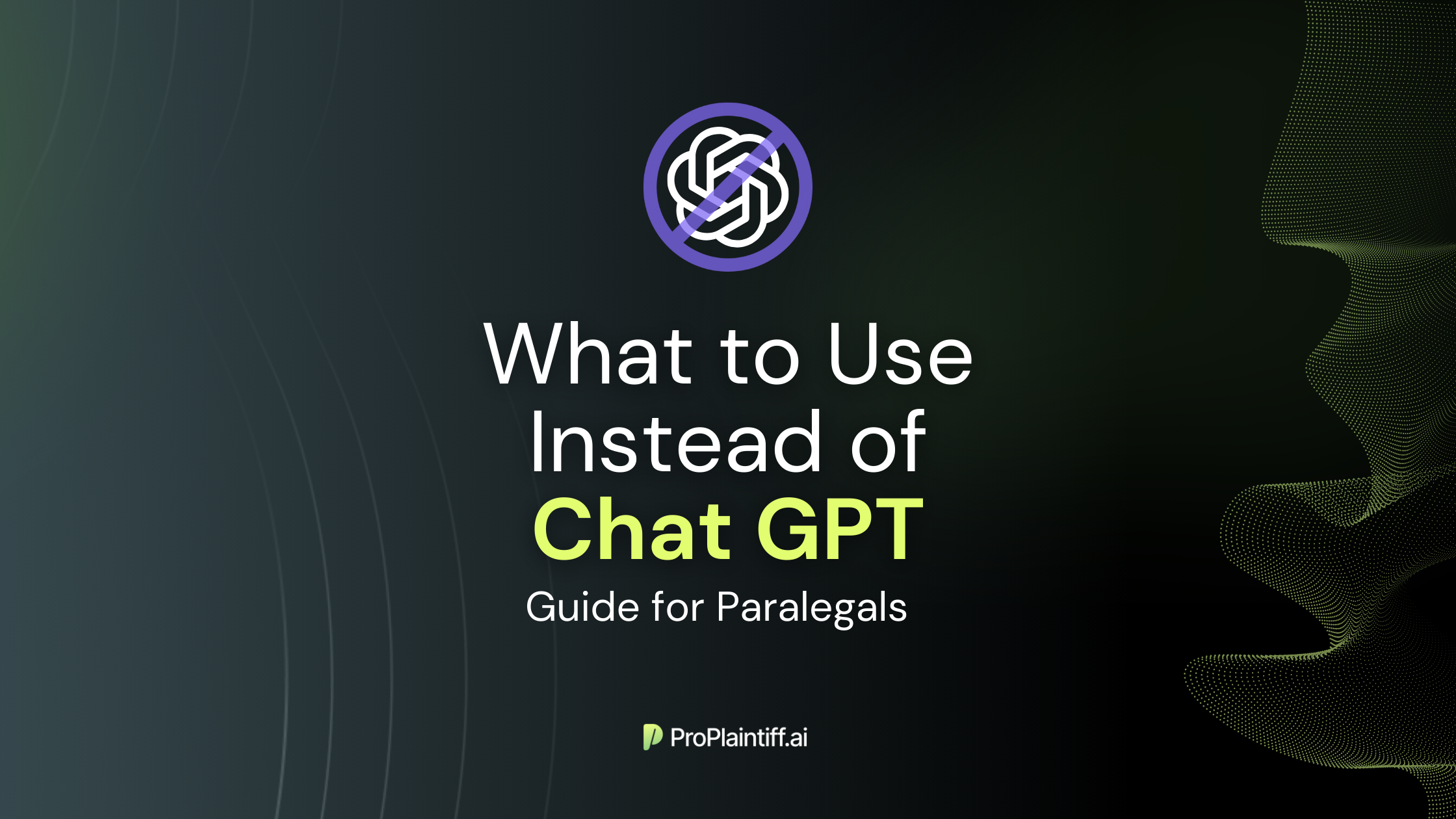
.webp)
.webp)
.webp)
.webp)

ChatGPT can write poetry, debug code, and even help plan your vacation. But when it comes to legal work, this popular AI tool poses serious risks that could jeopardize your career, violate client confidentiality, and even lead to court sanctions.
The consequences are real and devastating. Take the case of attorney James Martin Paul, who was sanctioned for repeatedly submitting court filings that included hallucinated case law and fabricated quotations generated by ChatGPT. Despite warnings, Paul continued this conduct across eight related cases, including four in federal court. The result was a legal nightmare: four of Paul's court cases were dismissed without leave to amend, and additional sanctions forced him to pay defense attorneys' fees for time spent responding to the fabricated filings.
If you're a paralegal, attorney, or legal professional considering AI to streamline your workflow, this article will show you exactly why general AI tools like ChatGPT aren't suitable for legal work—and what legal-specific alternatives can safely transform your practice.
Before we dive into the technical risks, let's look at what happens when legal professionals use the wrong AI tools. In a recent high-profile case, two law firms submitted legal briefs generated using ChatGPT. The result? Nine fabricated citations out of 27 total—that's over one-third of their legal authorities completely made up.
The court didn't take this lightly. The firms faced sanctions, professional embarrassment, and a stark reminder that general AI tools have no place in legal document preparation or legal research.
This isn't an isolated incident. Across the country, legal professionals are discovering that ChatGPT and similar tools can confidently cite rulings that don't exist, summarize outdated statutes, and provide legal advice that sounds authoritative but lacks any factual foundation.
The Problem: ChatGPT and other general AI models are trained to be conversational and helpful, even when they don't know the answer. This leads to "hallucinations," which are confidently stated, yet completely false information.
Legal Impact: Imagine asking ChatGPT about precedent for a personal injury case and receiving citations to cases that never existed. Or getting a confident explanation of a statute that was repealed five years ago. In legal work, there's no margin for error when it comes to factual accuracy.
Real Example: ChatGPT might confidently state: "In Johnson v. State Farm (2019), the California Supreme Court ruled that insurance companies must provide coverage for pre-existing conditions in auto accident claims." The problem? This case doesn't exist, but the AI presents it as fact.
The Problem: ChatGPT and similar platforms are not designed for sensitive legal documents. When you upload client files, case notes, or confidential information, you have no guarantee about how that data is stored, processed, or potentially reused.
Compliance Violations: Legal professionals are bound by strict confidentiality requirements. Using non-secure AI platforms for client work could violate:
The Risk: Your uploaded contract negotiations, medical records, or case strategies could potentially be accessed by unauthorized parties or used to train future AI models—exposing your clients' most sensitive information.
The Problem: ChatGPT is trained on general internet data, not legal databases or verified case law. It doesn't understand legal concepts like:
Legal Impact: The AI might provide information that's technically correct in one jurisdiction but completely wrong in yours. It can't distinguish between binding precedent and persuasive authority, or understand how recent rulings might have changed established law.
The Problem: When ChatGPT provides legal information, it rarely cites specific sources, and when it does, those sources may be fabricated or misattributed. There's no way to trace the AI's reasoning back to verifiable legal authorities.
Professional Risk: Legal work requires citation to authoritative sources. Courts, opposing counsel, and clients expect you to back up your arguments with verifiable case law, statutes, and regulations. AI that can't provide reliable sources puts your professional credibility at risk.
The solution isn't to avoid AI entirely—it's to use AI tools specifically designed for legal work. Here's what to look for in a legal AI platform:
Instead of gambling with general AI tools, legal professionals are turning to platforms specifically designed for legal work:
Purpose-Built Legal AI Platforms like ProPlaintiff.ai offer:
Specialized Legal Research Tools provide:
Contract Analysis Solutions such as ContractPodAI and Kira Systems offer:
Ready to move from risky general AI to secure legal AI? Here's how to make the transition:
Using ChatGPT for legal work isn't just ineffective—it's potentially catastrophic. The risks to client confidentiality, professional liability, and case outcomes far outweigh any perceived convenience.
Legal professionals who want to harness AI's power need tools built specifically for legal work, with the security, accuracy, and accountability that the legal profession demands.
Don't wait for a sanctions hearing or ethical violation to learn this lesson. The legal AI tools you need already exist—they're just not the ones making headlines for writing college essays.
The transition from risky general AI to secure legal AI doesn't have to be complicated, but it does require the right guidance and tools.
Download our comprehensive free guide: "Using AI with Confidence: The PI Paralegal's Guide to Getting Started" for detailed implementation strategies, platform comparisons, and security checklists.
This essential resource covers:
[Download Your Free Guide Here →]
Your clients trust you with their most sensitive legal matters. Make sure your AI tools are worthy of that trust.
Need help choosing the right legal AI platform for your practice? Book a demo to see how legal professionals are safely transforming their document review, contract analysis, and legal research workflows with purpose-built AI solutions designed specifically for the legal industry.